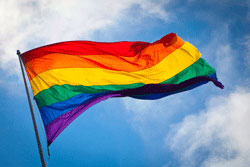On June 26 2015, the Supreme Court legalized same-sex marriage around the country, meaning that regardless of state laws, same-sex couples could marry in all states.
Previous to the ruling, same-sex marriage was legal in 38 states, as well as the territory of Guam and the District of Columbia. The public response to the unions has been becoming increasingly more and more positive.
The ruling passed with a five to four vote, with four judges voting against it and five voting in support of it. Justice Anthony M. Kennedy, one of the most liberal members of the court, and one who was widely outspoken about same-sex marriage, was the deciding vote. Justice Kennedy was the author of all three of the Supreme Court’s previous gay rights landmarks, such as when he struck down a federal law that would deny benefits to same sex couples in the United States v. Windsor two years ago.
Justices Ruth Bader Ginsburg, Steven G. Breyer, Sonia Sotomayor, and Elena Kagen joined Justice Kennedy in voting for the majority opinion. Justices Samuel A. Alito, Antonin Scalia, Clarence Thomas, and Chief Justice John G. Roberts voted against the ruling.
“No union is more profound than marriage,” said Justice Kennedy during the session. “It embodies the highest ideals of love, fidelity, devotion, sacrifice, and family… Marriage embodies a love that may endure even past death. It would misunderstand these men and women to say that they disrespect the idea of marriage… Their hope is not to be condemned to live in loneliness, excluded from one of civilization’s oldest institutions. They ask for equal dignity in the eyes of the law. The Constitution grants them that right.”
“I did not think the ruling was inevitable,” said Johanna Foster, the Director of the Sociology and Gender Studies programs. “I know as a sociologist that social outcomes are not always forgone conclusions, and society doesn’t always move in the direction of human freedom. Sometimes we gain civil and human rights only to see them swept away, as is the case today around many issues of racial, gender, and economic justice. I think the Court’s decision was made in the context of many years of intentional, organized, and hard-won fights of LGBT activists who worked strategically to bring about this historical decision.”
While the immediate reaction was overly positive – especially since Pride Weekend, a weekend dedicated to celebrating all in the LGBT+ spectrum, was just kicking off in New York City – there were some negative responses from the minority of those who still oppose same-sex marriage.
One of the most controversial responses is that of Kim Davis, the Kentucky county clerk who has been refusing to issue marriage licenses, claiming that same-sex marriage goes against her religious beliefs, even though Steve Beashar had instructed county clerks to comply with the SCOTUS ruling. Davis tried her case at many courts and lost each time; finally, she attempted to engage the Supreme Court, claiming that she had religious freedom. On September 1, the Supreme Court ordered her to begin issuing marriage licenses; after she refused, she was jailed on September 3, being held in contempt of the court. She was released on September 8, under the provision that she did not interfere with the issuing of marriage licenses, something that her deputy clerks have been doing in her absence. Other organizations, such as the Westboro Baptist Church, have stuck to their original beliefs and continue to oppose the ruling, along with anything else having to do with same-sex relationships.
Those on the LGBT+ spectrum have been increasingly more accepted in pop culture as well. Celebrities such as Ellen Page and Caitlyn Jenner have come out in the public eye recently, and most have received an overwhelmingly positive response. Many hit television shows, such as ABC’s How To Get Away With Murder and Netflix’s Orange Is The New Black, include characters in same-sex relationships. Fun Home, a musical that won five Tony Awards, including Best Musical, details the story of lesbian cartoonist Alison Bechedel and her relationship with her closeted father, and has opened to almost entirely positive reviews. Oscar Award winner Eddie Redmayne will tell the story of artist Lili Ebe in The Danish Girl, an upcoming film about the first known transgender woman. Other films, such as the upcoming Stonewall, will detail the history of the gay rights movement, focusing on the events at the Stonewall Inn.
“I thought it was a great decision,” said Malia Padalano, a sophomore English major. “Either way, people were going to get married, even if they had to travel to another state. Everyone should have the right to get married, no matter their sexuality.”
Foster also points out that the ruling is not the end of the fight for equal rights.
“While I am really thrilled about the decision from a basic human rights standpoint, I also think we should be careful about assuming that marriage equality is the only, or even the most important, issue for civil rights for LGBT people,” she said. “To tie a range of political, social, and economic rights to the institution of marriage is, in and of itself, a fundamentally flawed and unfair system as it means single people, regardless of sexuality, are not afforded the same privileges as married people. Absent other political, economic, and social protections for LGBT people, marriage equality will be more symbolic than substantive for many.”
IMAGE TAKEN from wikipedia.com


